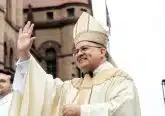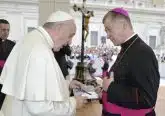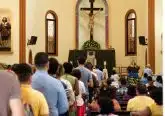Catholics mourn death of labor leader Richard Trumka
by Matt Hadro
Washington D.C., Aug 6, 2021 / 10:01 am
Catholics this week mourned the death of longtime labor leader Richard Trumka, who died on Thursday at the age of 72.
Trumka, who suffered a fatal heart attack on Thursday, was the president of the largest U.S. federation of labor unions, the AFL-CIO, since 2009.
“He was a good friend of America’s working people and of the Catholic Labor Network,” said Clayton Sinyai, executive director of the Catholic Labor Network, to CNA on Friday.
“As a Catholic labor leader himself, his faith meant a lot to him, and was part of what motivated him in aspiring to solidarity,” Sinyai said of Trumka.
The AFL-CIO includes 56 member unions and 12.5 million members nationwide. Before his term as president, Trumka served as secretary treasurer of the federation from 1995 to 2009. A Catholic and son of a Pennsylvania coal miner, Trumka became president of the United Mine Workers at age 33 in 1982, before his time in leadership at the AFL-CIO.
As president of the federation, Trumka was preceded by John Sweeney, also a Catholic.
Bishop John Stowe, OFM Conv. of Lexington on Thursday stated on Twitter, “We mourn the passing of a powerful voice for organized labor, so central to Catholic Social Teaching. May Richard Trumka receive the reward for his labors on behalf of laborers.”
Trumka had cited his Catholic faith in public statements on solidarity as part of Catholic social teaching. Solidarity was a theme of his leadership at AFL-CIO, Sinyai recalled to CNA.
“Solidarity is one of those peculiar values that bring the labor movement and the Church very close together, and he embodied that,” Sinyai said.
During Trumka’s leadership, however, the AFL-CIO also backed policies at odds with the U.S. Conference of Catholic Bishops (USCCB) concerning contraception, marriage, and sexuality.
The federation supports the Equality Act, broad federal legislation which passed the U.S. House in March. The bill would elevate sexual orientation and gender identity to protected classes in federal civil rights law. The USCCB has warned that the Equality Act would promote the redefinition of marriage and transgender ideology and “punish” religious groups and individuals opposed to such new government norms. Some pro-life leaders also have also warned that taking such a step could legislate a right to an abortion.
Trumka spoke forcefully in support of these proposals in March, stating: “A union contract has long been the greatest protection from homophobia and transphobia on the job, and we urge Congress to send both the PRO Act and the Equality Act to President Biden’s desk this year.”
Trumka also publicly defended Planned Parenthood in 2015, amid efforts to strip the organization and its affiliates of taxpayer dollars. Planned Parenthood is the nation’s largest abortion provider.
“Planned Parenthood provides comprehensive healthcare services to women across the country,” Trumka stated.” We support its core mission of offering safe healthcare services to women in need.”
The federation has also made past statements in favor of access to contraception, including passing a resolution in support of “reproductive rights” in 2012 while the USCCB and other religious groups were fighting the HHS contraceptive mandate.
“Women have fought hard for the right to safe, legal reproductive health services and the freedom to exercise that right,” the federation’s executive council stated in support of the mandate in March 2012.
Trumka made public statements in support of Catholic social teaching on solidarity. He introduced Cardinal Oscar Rodriguez Maradiaga at a June 2014 event hosted by the Catholic University of America’s Institute for Policy Research & Catholic Studies, “Erroneous Autonomy: The Catholic Case Against Libertarianism.” Then-Bishop Blase Cupich of Spokane also spoke at the event, shortly before his elevation to Archbishop of Chicago.
In his 2014 address, Trumka spoke on solidarity and his Catholic faith as a child of coal miners. “I grew up in a community where the church was alive with working people. It was a refuge against injustice, a place of compassion, a flesh-and-blood sanctuary,” he said.
The event was criticized by some as featuring fallacious depictions of libertarians, failing to distinguish between philosophical foundations of libertarianism at odds with Church teaching, and policies supported by some libertarians which do not contradict Church teaching.
In a 2016 speech at Seton Hall University on the fifth anniversary of Pope Francis’ election to the papacy, Trumka called the pope’s message on solidarity “revolutionary, even destabilizing.”
“The core of Pope Francis’ ministry for working people is love. He tells us we matter. Our work and our lives count,” he said, noting that the pope’s “love for work and workers is the heart of his challenge to neoliberalism, to the false and destructive idea that we should allow unregulated markets and greed to dictate what happens in our global society.”
On multiple occasions, Trumka shared a Catholic story of his childhood as part of a family of coal miners in western Pennsylvania. The police force of the local coal mine allegedly attacked his father and grandfather for trying to form a union of coal workers. His father and grandfather sought refuge at the local Catholic parish, and the pastor confronted the police outside with a crucifix, saying that the church was a “sanctuary,” he said.
“This Catholicism was our shield as poor immigrant coal miners,” he said at Seton Hall.













